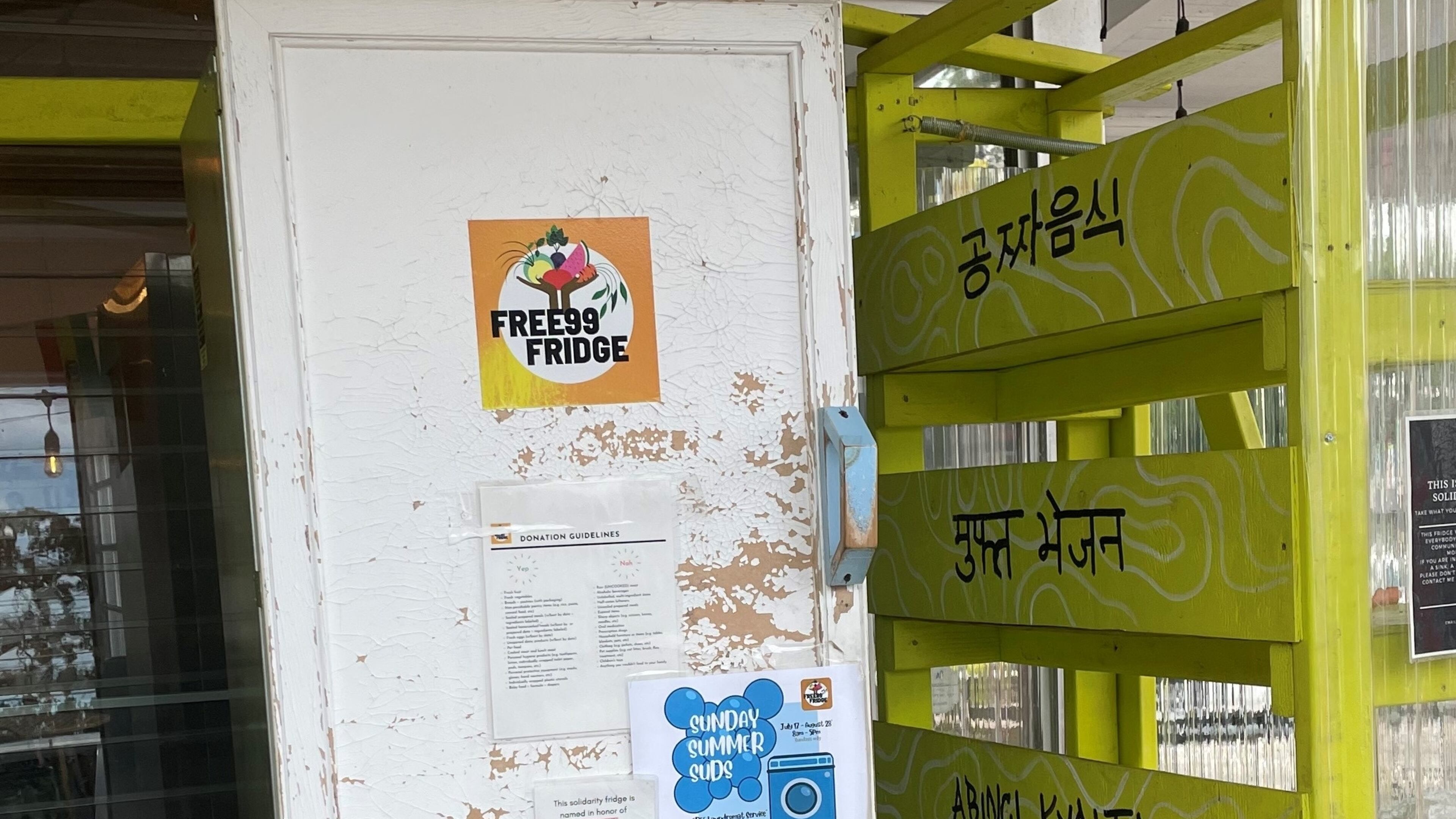OPINION: Free fridges keep community vibe alive

On a Saturday afternoon in Clarkston, the Free99Fridge at Refuge Coffee is fully stocked and good thing it is — in the span of five minutes, no fewer than five people have stopped to “shop” the contents of the free community fridge and pantry.
This fridge is one of two Free99Fridges currently operating in metro Atlanta.
There are carrots, cabbage and canned goods in the pantry along with giant bags of Eukanuba dog food and personal care products.
“They usually don’t have much of that,” says a woman pulling a metal cart while letting me know that I should grab the dog food now if I need it.
The refrigerator contains sandwiches in labeled and dated plastic bags and plastic quart containers of soup from the Zadie Project, a nonprofit that makes seasonal soups at Souper Jenny Westside and distributes them through community partners. The small freezer drawer below has a few containers of red lentil jambalaya and a bag of Birdseye chicken-flavored rice.
Community fridges began popping up across the country during the early days of the pandemic. Supporters say the effort helps remedy food insecurity and avoid the bureaucracy of some food distribution programs by allowing the community to take control of resource redistribution. There are currently more than 260 free fridges in 37 states according to the freedge.org community fridge database.
Latisha Springer launched Free99Fridge after spending days in the scorching heat on the streets of Alpharetta protesting the 2020 killing of George Floyd. “One day I decided that standing out on the corner being called a (racial epithet) for five hours wasn’t really helping my community,” Springer told Eater Atlanta at the time.
Springer put together a slide deck about community fridges and engaged area businesses. The first of the fridges opened August 2020 at Best End Brewing in West End. For Springer, it was an effort to rally neighbors to help those in need.
Each Free99Fridge fridge is dedicated to a Black person who has died tragically. The Clarkston fridge is in memory of Sandra Bland, the 28-year-old Black woman who was found hanged in a jail cell days after being arrested during a traffic stop in Texas in 2015.
There are other community fridges in Milledgeville, Athens, in addition to metro Atlanta, but in recent weeks, donors and food seekers have arrived at Free99Fridge locations in East Atlanta, Kirkwood and Sweet Auburn, only to discover that those fridges have been removed.
On social media, neighbors shared their insights and rumors and directed donations to the Free99Fridge locations in Clarkston and North Decatur Presbyterian Church.
According to Jamie Russell, co-owner of Poor Hendrix in Kirkwood, the decision to remove that fridge from the alley space beside the restaurant was Springer’s decision.
Springer declined to be interviewed for this column, but Sarah White, a local attorney and early Free99Fridge volunteer agreed to talk by phone.
She didn’t know the details of why the fridges were removed but she did know that part of the reason is limited resources.
“Theoretically, if there were enough volunteers, then surely, even if we had to move a fridge for some reason, there would be another location right around the corner,” said White who has dropped off leftover food from networking events, conducted wellness checks to make sure the fridge and pantry are clean, and updated the community to let residents know what food is available at any given time.
“Consistency is really important … something that is not built into the less organized mutual aid. If you don’t have weekly volunteer hours, you as a volunteer have to hold yourself accountable,” she said.
But accountability is a fickle thing.
When I wrote about student loan debt forgiveness a few weeks ago, some readers told me students need to be held accountable for their borrowing rather than holding colleges accountable for skyrocketing tuition or holding employers accountable for wages that have left purchasing power at the same level it was in 1980.
Who has accountability and what they are accountable for is something we could debate endlessly. But, at some point, we have to accept the deleterious impact of an unjust power system and ask ourselves what we can, or should, do about it.
Free fridges are not going to end the root causes of food insecurity or remedy the problem of food waste, but community fridges have a unique opportunity to fill the needs of some residents, particularly during a crisis.
The question then, is what happens when the crisis — death from a virus or police brutality — no longer feels imminent.
“In 2020, there was a remarkable sense of community and pulling together to make sure that people had everything they needed,” White said. “In 2022, inflation is crazy. Are we in a recession or not? I don’t know. The vibe is different.”
In Clarkston, the burst of activity around the Free99Fridge foodstuffs was evidence of the continued need for community fridges in some neighborhoods.
It’s time to get the back to that 2020 vibe. The well-being of our communities depends on it.
Read more on the Real Life blog (www.ajc.com/opinion/real-life-blog/) and find Nedra on Facebook (www.facebook.com/AJCRealLifeColumn) and Twitter (@nrhoneajc) or email her at nedra.rhone@ajc.com.


